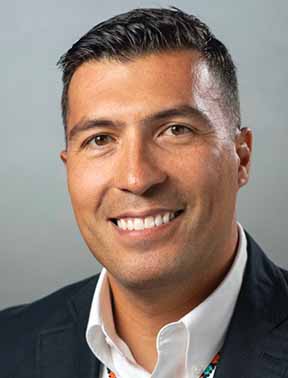Candidate statement
|
Ernesto Colin, Ph.D. Chair-Elect Panolti. My name is Ernesto Colín. I write from occupied
Tongva lands in so called Los Angeles. I am a visual artist, danzante,
first generation student, son of immigrants, and Associate professor of
Teaching & Learning at Loyola Marymount University.
I have been a NACCS member and conference attendee for over 30 years.
Starting in high school, NACCSistas inspired community activism,
ceremony, an academic journey in Chicanx studies in college, and my
teaching of language and ethnic studies in public high
schools. I am a lifetime member of NACCS, an academic home of my tenure
track career. I have degrees in Chicanx Studies, Spanish, Education,
and Anthropology of Education. My scholarly interests center on Danza,
Indigenous Education, Anthropology of Education,
and Teacher Education.
The femtorship and community I find at NACCS has sustained me and I
have served in leadership in the SoCal Foco, Indigenous Caucus, and
through a four year term on the board as treasurer. I feel confident I
possess enough experience, mechanical knowledge,
and perspective to continue to serve the membership, and I acknowledge
the tremendous wisdom and labor of colleagues who have been fountains of
support in those roles. I am genuinely humbled by this nomination to
serve as Chair-elect in the organization, standing
on the shoulders of giants in our field. I am called to serve in the
tradition of
tekio and collective governance maintained by our elders,
endeavoring to sustain the tremendous talent, human network, mentoring,
dynamic scholarly exchange, activist fire, and platform for communities
within the organization.
I peer out to the coming year. My main goal is for NACCS to
continue fostering conditions for scholars to thrive. I survey deeply
troubled times: fascisim and oligarchy, dismantling of safety nets,
destruction of research and resources, illegal deportations,
refugee children stripped of advocates, war and genocide, campus
anxieties, misinformation, just to name a few of the countless assaults
on our communities. On the one hand, these conditions are not new to us
and we can look to our ancestors for strength.
On the other, we are at a juncture which requires innovative
persistence, resistance, survivance, and re-existence. As much as ever,
we look to our artists to help us imagine, historians to remind us,
political scientists and activists to help us strategize,
healers to center us, and creators and scholars of all disciplines to
study, teach, and celebrate the amazing dynamics of Chicana/e/o/x
communities everywhere.
La lucha sigue y sigue. New forms of yaotilistli (art of combat) emerge.
|
|
|
Term: 3 years (chair-elect, chair, and past-chair). To be eligible to run for this office, a candidate for Chair-Elect must: (1) be a member in good-standing; (2) have been a member continuously for the previous four (4) years before assuming office; (3) have had significant, active participation in NACCS; (4) have provided a significant, active contribution to Chicana & Chicano Studies; and (5) have contributed to advance the interests and needs of the Chicana & Chicano community. This person cannot hold more than one National Board office in NACCS at the same time, nor run consecutively for this office. The chair-elect will then take on the responsibilities of the Chair and then the Past-Chair. |
|


